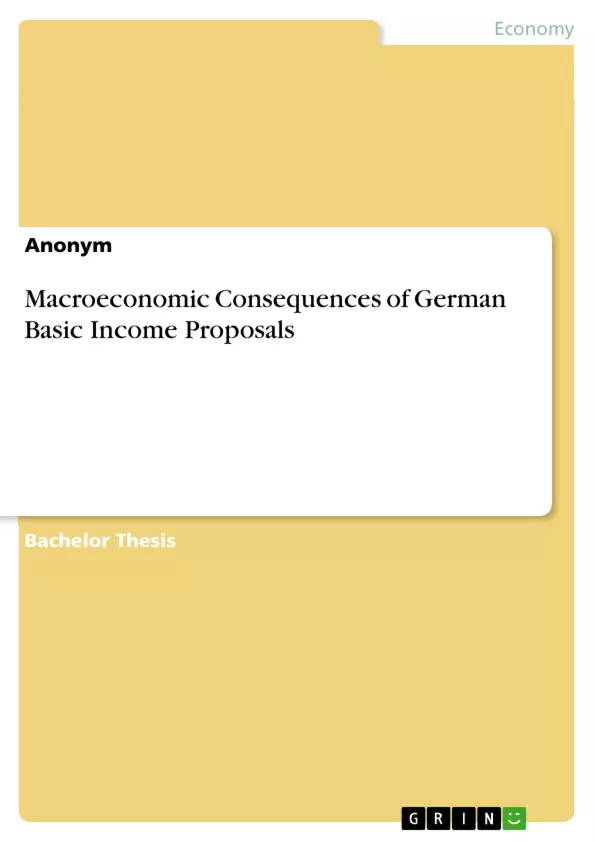Recently, the idea of implementing a basic income system in terms of negative income tax (NIT) or unconditional basic income (UBI) is considered as conceivable alternative to the status quo. The purpose of this thesis is to give an objective illustration of current German UBI proposals, especially concerning labour market effects and distributional consequences. Through economic key figures, I compare the depicted concepts in order to assess their suitability for the German case. What features does a UBI need to be “perfectly customised“? Actually, is it possible to achieve all ambitions or are there goals that cannot be accomplished simultaneously? With regard to the different objectives, which proposition is the best?
The idea of basic income goes way back to 1943 when Lady Rhys-Williams firstly proposed a system that integrates taxation and social benefits. In the 1960s the Nobelist and famous economist, Milton Friedman carried on promoting the proposal of a NIT. Four field studies with a NIT, that were conducted in the United States between 1968 and 1982 showed that labour market participation only diminished slightly (Widerquist, 2005). Nevertheless, because every labour market is individual and depends on various features, numerous critics point to the unpredictability of labour market effects, especially on the supply side. Although Alaska, Brazil and Namibia recently introduced an UBI scheme, it still remains an unknown field from a practical perspective, which is why further theoretical considerations and simulations are requiered to develop a suitable concept for the German case.
Inhaltsverzeichnis (Table of Contents)
- 1 Introduction
- 2 Solidarisches Bürgergeld by Althaus (2007)
- 2.1 Budget Neutrality
- 2.1.1 Results on National Budget: Althaus Concept
- 2.1.2 Budget Neutral Alternatives by Horstschräer et al. (2010)
- 2.2 Labour Market Effects
- 2.2.1 Supply Effects: Theoretical Considerations
- 2.2.2 Supply Effects: Microeconomic Simulation
- 2.1.3 Demand Effects: Theoretical Considerations
- 2.3 Distributional Effects
- 3 HWWI Proposal by Hohenleitner & Straubhaar (2007)
- 3.1 Labour Market Effects: Theoretical Considerations
- 3.2 Labour Market Effects: Microeconomic Simulation
- 4 Conclusion
Zielsetzung und Themenschwerpunkte (Objectives and Key Themes)
This thesis aims to provide an objective assessment of current German UBI proposals, particularly focusing on their impact on the labor market and distributional consequences. It compares different UBI concepts based on economic key figures to determine their suitability for Germany. The thesis explores the feasibility of achieving various goals simultaneously and analyzes which proposal is most effective in achieving specific objectives.
- Evaluation of existing German UBI proposals
- Analysis of labor market effects (supply and demand)
- Assessment of distributional consequences
- Comparison of different UBI concepts
- Examination of the suitability of UBI for Germany
Zusammenfassung der Kapitel (Chapter Summaries)
The thesis begins with an introduction that provides context for the study of UBI in Germany, highlighting the challenges faced by the existing welfare system and outlining the potential benefits of UBI.
Chapter 2 focuses on the "Solidarisches Bürgergeld" proposal by Althaus (2007), examining its budgetary implications, labor market effects (both supply and demand), and distributional consequences. This chapter analyzes the theoretical considerations and presents results from microeconomic simulations.
Chapter 3 explores the HWWI proposal by Hohenleitner & Straubhaar (2007), concentrating on the theoretical considerations and microeconomic simulations of its potential labor market effects.
Schlüsselwörter (Keywords)
The primary keywords and focus topics of this thesis include unconditional basic income (UBI), negative income tax (NIT), labor market effects, distributional consequences, German welfare system, budget neutrality, microeconomic simulation, and social justice.
Frequently Asked Questions
What is the difference between Negative Income Tax (NIT) and Unconditional Basic Income (UBI)?
UBI is a fixed amount paid to everyone regardless of income, while NIT is integrated into the tax system, where people below a certain income threshold receive payments instead of paying taxes.
What are the main labor market concerns regarding basic income?
Critics often point to the unpredictability of labor supply effects, fearing that guaranteed income might reduce the incentive to work, although some studies show only minor decreases in participation.
What is the "Solidarisches Bürgergeld" proposed by Althaus?
It is a specific German UBI proposal from 2007 that focuses on budget neutrality and restructuring the social security system to provide a basic level of financial security.
Is a basic income system financially feasible for Germany?
The thesis explores this through economic key figures and microeconomic simulations, comparing different proposals like the HWWI model to assess their suitability and budgetary impact.
Who were the early proponents of basic income concepts?
Lady Rhys-Williams (1943) and Nobel laureate Milton Friedman (1960s) were significant early advocates for integrating taxation with social benefits.
- Citar trabajo
- Anonym (Autor), 2014, Macroeconomic Consequences of German Basic Income Proposals, Múnich, GRIN Verlag, https://www.grin.com/document/335063



